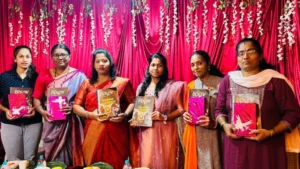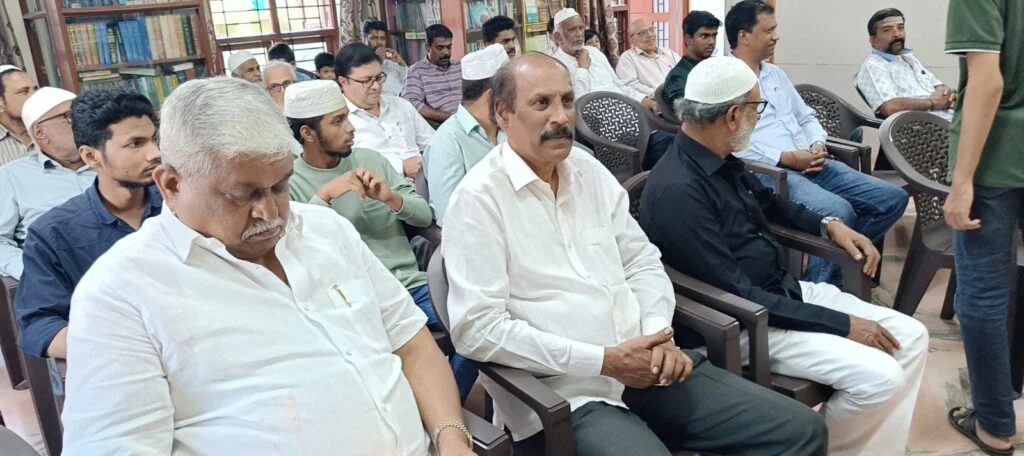 When hearts connect over a shared meal, walls crumble and bridges rise.” Ramadan 2025 in Karnataka was not just a season of fasting and prayer – it became a powerful movement of interfaith dialogue, compassion, and community bonding. In a climate where fear often overshadows familiarity, the members of Jamaat-e-Islami Hind (JIH) Karnataka launched a heartfelt initiative across the state: to open their homes, hearts, and mosques to neighbours of every faith.
When hearts connect over a shared meal, walls crumble and bridges rise.” Ramadan 2025 in Karnataka was not just a season of fasting and prayer – it became a powerful movement of interfaith dialogue, compassion, and community bonding. In a climate where fear often overshadows familiarity, the members of Jamaat-e-Islami Hind (JIH) Karnataka launched a heartfelt initiative across the state: to open their homes, hearts, and mosques to neighbours of every faith.
From the bustling lanes of Mangalore to the quiet, dusty paths of Basavakalyan’s villages, this Ramadan witnessed something extraordinary – a people’s movement for unity powered by dates, warm smiles, and sincere conversations.
Iftar Beyond Ritual: A Table for All
The idea was simple, yet profound: use Iftar, the meal at sunset to break the fast, as a space for inclusivity. Not limited to mosques or community halls, Iftars were held at public squares, modest homes, and even in remote villages. What made them unique this year was the guest list – Hindus, Christians, Dalits, tribal leaders, teachers, and thinkers, all sitting shoulder to shoulder with Muslims, breaking bread and breaking stereotypes.
“These weren’t token gatherings,” said a JIH volunteer from Hubli. “They were moments of genuine connection. We didn’t just share food – we shared stories, values, and hopes.”
In each gathering, short talks were given on the philosophy of fasting, the ethical teachings of Prophet Muhammad ﷺ, and the universal messages of the Qur’an – not as sermons but as conversations. Kannada-translated Qur’an copies were offered as thoughtful gifts, often evoking surprise and curiosity.
“I never knew the Qur’an existed in Kannada,” remarked Uma Devi, a school teacher who attended an Iftar in Shikaripur. “I thought it was only in Arabic. This gesture made me feel respected and included.”
Village Iftars: Kindness in its Purest Form
The initiative’s heart-warming ripple reached the rural corners of Karnataka – over 100 villages around Basavakalyan alone saw interfaith Iftar events. In many places, the hospitality came from the other side: non-Muslim villagers arranged water for ablution, helped with seating, and watched, moved and mesmerised, as Muslims prayed together in unison.
“In those few minutes,” said one attendee from a village near Bidar, “religion wasn’t a barrier. It was a shared reverence for something bigger than ourselves.”
When the Guest Becomes the Host
Perhaps the most remarkable scene unfolded in Shiralkoppa, where non-Muslim residents took the lead in organising an Iftar inside a mosque. After obtaining permission from the mosque committee, they designed invitation cards, distributed them door-to-door, and invited their Hindu and Muslim friends and colleagues to participate. Inside the mosque, it was these guests – Hindus and others – who introduced newcomers to the architecture, purpose, and peaceful atmosphere of the space.
It was a symbolic reversal of roles that challenged conventional boundaries and highlighted the unifying potential of shared spaces and shared intent.
Women at the Forefront of Interfaith Engagement
This Ramadan also saw Muslim women stepping into leadership roles in interfaith engagement. From Mysore to Gulbarga, women organised intimate home-based Iftars, inviting female neighbours and colleagues. The ambiance was simple, the tone personal, and the message powerful.
They spoke not only of fasting but of faith, compassion, and womanhood in Islam. Translations of the Qur’an in Kannada gifted at the end often led to candid questions, revealing a thirst for understanding.
One woman, touched by the warmth of her Muslim host, asked, “Why don’t we hear more of this side of Islam?” – a reminder of how far-reaching ignorance can be, and how life-changing genuine interaction often is.
Reaching the Educators: Seeds for the Future
In Bidar and Bhtkal, JIH Karnataka organised special Iftar sessions exclusively for school teachers and educators. These weren’t mere formalities – they were dialogues about shaping future generations. Discussions revolved around religious harmony, moral education, and the role of teachers in eradicating prejudice.
Many educators expressed deep appreciation. “This initiative opens our minds,” said a senior teacher from Bhatkal. “It reminds us that our responsibility goes beyond textbooks. We must teach values of coexistence and respect.”
Engaging Influencers: Thoughtful Outreach
Recognising the role of opinion-makers, local JIH workers in Gulbarga and Terikerey visited community influencers and officials, gifting them Kannada translations of the Qur’an along with hampers of dates and dry fruits. The gesture was small, but the message was big – Islam is a faith of peace, dialogue, and dignity.
These engagements not only created moments of mutual respect but also left a lasting impression on individuals who play key roles in shaping public discourse.
A New Narrative in Mangalore
Once a region scarred by communal tensions, Mangalore witnessed a sea change this Ramadan. Massive public Iftar gatherings attracted thousands – Muslims and Hindus, students and traders, elders and youth. The language of unity was Kannada, the emotion was universal.
“There was no fear, no suspicion – just respect,” said a college student who attended an Iftar with his Hindu roommate. “It felt like the beginning of something bigger.”
“Fasting, Feasting, and Fight against Prejudice”
Ramadan 2025 didn’t just fill stomachs – it filled hearts and shattered myths. What started as a religious obligation became a civic celebration. JIH Karnataka’s approach showed that educating others about faith need not be loud to be impactful. With wisdom, humility, and hospitality, they sparked what can only be described as a silent service.
This model of interfaith Iftar is now being emulated by other Muslim organisations, indicating a larger shift in mindset – from insularity to outreach, from ritual to relevance.
As Karnataka moves forward, it carries with it the echoes of this Ramadan: footsteps entering Masjids for the first time, smiles exchanged across faiths, and conversations that will long outlive the dates and meals that started them.


